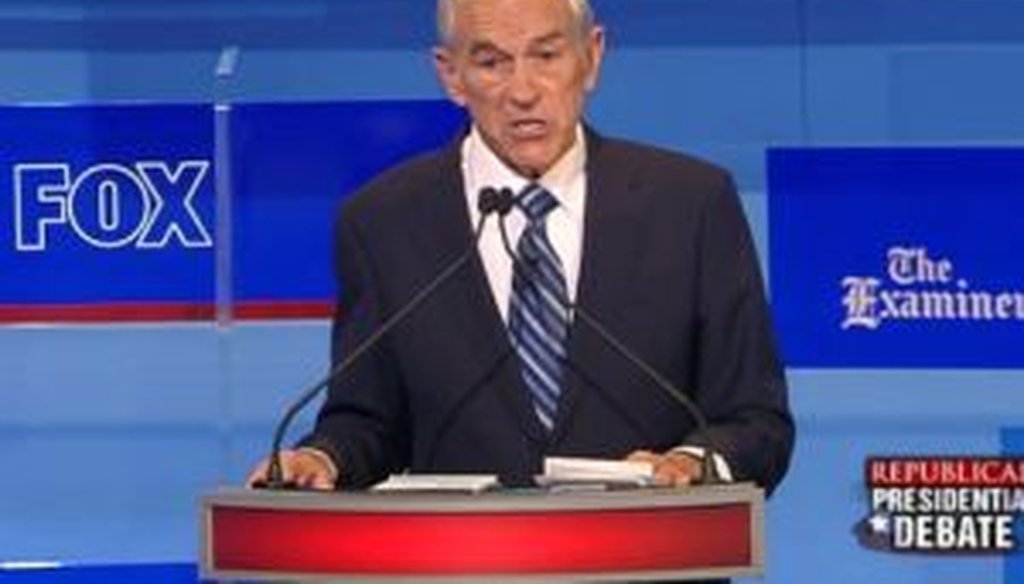Stand up for the facts!
Our only agenda is to publish the truth so you can be an informed participant in democracy.
We need your help.
I would like to contribute

Rep. Ron Paul, R-Texas, was one of eight presidential candidates to take part in the Aug. 11, 2011, debate in Ames, Iowa.
U.S. Rep. Ron Paul says 'the country's bankrupt"
Republican presidential candidate Rep. Ron Paul of Texas, who has raised warning flags about U.S. debt for decades, declared in an Iowa debate Aug. 11, 2011, that "the country's bankrupt."
Okay, we'll bite: Is it?
Featured Fact-check
PolitiFact Wisconsin tested a similar claim in February from Gov. Scott Walker ("We’re broke. We don't have any more money.") and found it False. But Paul's talking about the whole country.
BAIER: Congressman Paul, as you know, when Standard & Poor's downgraded the country's credit rating last week, one of the reasons S&P listed was because of partisan gridlock in Washington. Congressman, what specific things would you do as president to increase growth, calm the markets, create jobs that could pass through a divided Congress?
PAUL: Well, they didn't downgrade it mainly because they couldn't come to a conclusion. They couldn't come to a conclusion because they didn't know what was going on. The country's bankrupt, and nobody wanted to admit it. And when you're bankrupt, you can't keep spending.
And all these proposed cuts weren't cuts at all. What you have to do is restore sound money. You have to understand why you have a business cycle, why you have booms and busts. If you don't do that, there's no way you can solve these problems.
And the booms and busts comes from a failed monetary system that -- the interest rates that are way lower than -- than they should be encourages malinvestment and debt. And to get out of that, all this other tinkering, you cannot do that unless you liquidate debt. You don't bail out the people that are bankrupt and dump the debt on the people. That is what's happened.
So you have to allow liquidation of debt, eliminate the malinvestment. Then you go back and you can get growth again by having a better tax structure, lower taxes, invite capital back into this country, get a lot less regulations. And under those conditions, you can have growth again.
For this fact-check, we're not going to explore whether there's a grand conspiracy to hide the condition of U.S. finances. Rather, we'll focus on the simple question of whether the country is bankrupt.
We e-mailed Paul's campaign asking for support for his statement, but didn't hear back by our deadline. Instead, we'll rely on common definitions of "bankrupt" that seem to best fit the context of Paul's statement. One is "declared in law unable to pay outstanding debts." Another is "reduced to a state of financial ruin: impoverished."
We'll tackle the more specific definition first. Since the U.S. government hasn't landed in bankruptcy court and been declared unable to pay its bills, we'll simplify it to whether the United States can pay its debts.
Ratings agencies such as Standard & Poors, Moody's and Fitch pay attention to this very question. They offer sovereign credit ratings based on the same idea as your credit score: What's the risk a nation might default on its debt by failing to pay its bills? And S&P did downgrade the country's credit rating on Aug. 5, 2011.
But what does that mean, exactly?
The United States had a AAA credit rating, which S&P defines as having "extremely strong capacity to meet its financial commitments." It's the highest rating you can get. After the downgrade, the United States has a AA+ credit rating. It's just one notch down from AAA on a scale that has more than 20 notches. S&P now says the United States "has very strong capacity to meet its financial commitments." The "+" shows that the U.S. rating is on the high side of AA.
Meanwhile, two other ratings agencies, Moody's and Fitch, didn't change their U.S. ratings — America still has the highest rating they offer.
Fitch Ratings said on Aug. 2, 2011, that "despite the heated political debate ... corporate sector balance sheets and profitability are healthy, underlying productivity growth is still relatively strong, and the U.S. dollar remains unchallenged as the global reserve currency."
We'll note that the ratings are forward-looking -- they evaluate whether the United States is likely to default in the future. But Paul went further than that. He said "the country's bankrupt," in the present tense. So we asked the U.S. Treasury: Can the country pay its bills right now?
Yes, said spokesman Matt Anderson.
"Because Congress acted to prevent a default crisis, the government has been able to meet its financial obligations," he said.
Meanwhile, he pointed out that the Bureau of Public Debt has had no trouble selling bills, notes and bonds to finance the public debt.
Indeed, after S&P lowered America's credit rating, the amount of interest the United States has to pay on its new debt actually went down — our credit got cheaper! Why? As financial markets swing, investors still consider U.S. government securities a safer place than alternatives to park their money.
(We should also note that unlike Wisconsin, which has many of the same tools to make ends meet -- taxes, layoffs, spending cuts, debt shifting -- the federal government as sovereign nation could just print more money.)
Now, about that second definition, "reduced to a state of financial ruin: impoverished."
Allow us an analogy: Your paycheck doesn't cover your bills every month. But you have a great credit score, use your credit card to cover the difference, and have no trouble paying your credit card bill. Would you describe yourself as "bankrupt" or "impoverished"?
We wouldn't. We'd reserve that description for the neighbor who was behind on his mortgage and couldn't pay his creditors.
Paul said: "The country's bankrupt." While ratings agencies have warned that the United States needs to put together a plan to reduce its deficit to hold onto its strong credit into the future, the country so far has paid its bills, which does not match the definition of being bankrupt. And while S&P lowered its rating a notch, two other agencies still give the U.S. the top grade for its ability to pay its bills. We rate his statement False.
Our Sources
Fox News, Republican candidates debate, Aug. 11, 2011, accessed via CQ Transcriptswire (subscribers only)
St. Petersburg Times, "Ron Paul spreading same message as always, resonating finally," Aug. 11, 2011
PolitiFact Wisconsin, "Wisconsin Gov. Scott Walker says Wisconsin is broke," March 3, 2011
Google Dictionary, "bankrupt," accessed Aug. 12, 2011
Merriam-Webster, "bankrupt," accessed Aug. 12, 2011
Standard & Poor's, "United States of America Long-Term Rating Lowered To 'AA+' On Political Risks And Rising Debt Burden; Outlook Negative," Aug. 5, 2011
Interview with John Piecuch, spokesman for Standard & Poors, Aug. 12, 2011
E-mail interview with Peter Fitzpatrick, spokesman for Fitch Ratings, Aug. 12, 2011
Interview with Matt Anderson, spokesman for U.S. Treasury Department, Aug. 12, 2011
Treasury Department, Bureau of Public Debt, "How Treasury Auctions Work," accessed Aug. 12, 2011
Treasury Department, Bureau of Public Debt, "Today's Auction Results," accessed Aug. 12, 2011
U.S. Treasury Department, "Debt Limit," accessed Aug. 12, 2011
Barron's, "Fresh from Downgrade, Treasuries Rally," Aug. 8, 2011
Browse the Truth-O-Meter
More by Becky Bowers
U.S. Rep. Ron Paul says 'the country's bankrupt"
Support independent fact-checking.
Become a member!
In a world of wild talk and fake news, help us stand up for the facts.
























































